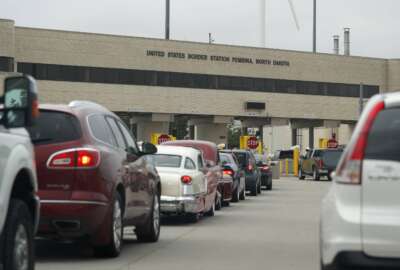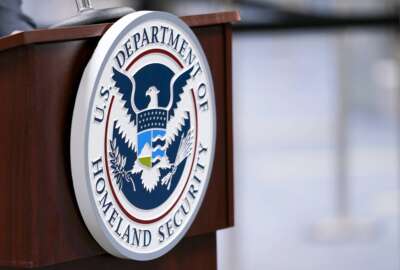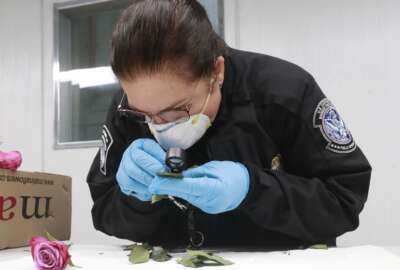Customs and Border Protection turns to special hiring authorities to recruit investigators
Customs and Border Protection is adding more criminal investigators to its Office of Professional Responsibility, the office in charge of investigating serious...
Customs and Border Protection is adding more criminal investigators to its Office of Professional Responsibility, the office in charge of investigating serious misconduct allegations by CBP staff. The office also reviews use of force and critical incidents like in-custody deaths. The agency is using several hiring tools. For how its going, Federal Drive with Tom Temin spoke with the executive director of investigative operations, Dan Altman.
Interview Transcript:
Dan Altman Within U.S. Customs and Border Protection, the only office that employs criminal investigators is the Office of Professional Responsibility. And most people might associate OPR with what would be a traditional internal affairs role within a law enforcement agency investigating allegations of administrative or criminal misconduct on the part of our employees. But we also have a vital role to review incidents that bring into question the transparency and accountability of CBP, such as in-custody deaths, use of force incidents, vehicle pursuits of serious injuries, employee deaths and other incidents that garner public attention and concern. And so our special agents have really two roles. One is to investigate serious misconduct, and the other is to review these incidents and provide credible and transparent investigations explaining to the public what happened in those instances.
Eric White So it’s more of CBP is a law enforcement agency. And so this is just sort of a way of keeping track of any incidents that occur. Like you mentioned, while people are in custody and things of that nature.
Dan Altman Yes, I think most people don’t realize that U.S. Customs and Border Protection is actually America’s largest law enforcement agency, with over 40,000 uniformed personnel conducting enforcement operations around the clock in just about every environment you can imagine. Consequently, there are going to be instances in which people make allegations that our personnel have fallen short of the very high expectations we have for them. And when those instances occur, we investigate them aggressively. If the allegations are not true, then we will clear our employees. In the instance where the allegations are true, we will either take a strict administrative action against them or present those cases for prosecution. In addition to that, because CBP has such a dynamic enforcement mission, there are instances when we have serious incidents involving either enforcement operations or persons in custody. So our highly trained special agents are able to respond to those things at a moment’s notice, sometimes in very remote locations to make sure that we look through those things in a really thorough manner.
Eric White So the desire is to hire at least 300 more. Is there a backlog of investigations that has occurred or is there a deficiency? How did the number 300 come about?
Dan Altman Yeah. So so as America’s largest law enforcement agency, there’s a really strong need for oversight within CBP. And the Department of Homeland Security is one of the newest cabinet agencies within the U.S. government. And U.S. Customs and Border Protection is also a very new agency. And over the 20 year history of our organization, the type of oversight that’s been provided has evolved. About six or seven years ago, there became a really clear realization that CBP itself required a very robust oversight mechanism. And so there was a recommendation made by the Homeland Security Advisory Council that CBP’s Office of Professional Responsibility be staffed with about 550 special agents. And so our hiring initiative now to bring about 300 additional agents on board will get us to that recommended level that we realized we needed so many years ago. So we feel extremely fortunate to have the confidence and the resources available to be able to really plus up our organization, get ourselves the place where we are able to provide the type of oversight that’s needed.
Eric White Got it. So it wasn’t a case of more responsibilities for CBP and the agency getting larger itself, or did that actually come into play when those recommendations were made?
Dan Altman Yes. So when the initial recommendation was made to plus up our oversight capabilities to 550 special agents back in 2016, it did, in fact, take into account the size of the agency. What it did not necessarily take into account or sort of the enhanced expectations around transparency and accountability, which are really being expected of all law enforcement agencies at this point. And so in addition to our traditional internal affairs function of investigating misconduct, whether it be criminal or serious administrative misconduct, we’re also using those new positions to provide really aggressive oversight on other types of incidents that might happen, including in-custody deaths, use of force incidents or other situations that are of concern.
Eric White Dan Altman is executive director of investigative operations for the Office of Professional Responsibility at Customs and Border Protection. So let’s talk hiring. What methods are you all going to use to fill these openings and who exactly are you looking for? You have an investigative background yourself. Is that the kind of person that you’re trying to find?
Dan Altman Yes. So when you’re building an investigative organization, diversity is really critical. I mean, diversity, every respect, starting with a diversity of perspective, diversity experience, visual diversity, diversity of language capabilities. And so as we build out this oversight organization, we’re trying to use as many different hiring mechanisms as we can to get the most, most diverse workforce possible. So starting with trying to use our traditional recruitment methods, which would include just vacancy announcements on OPM’s USA Jobs website, but we’ve also had specific vacancy announcements that are targeting recent college graduates. And most recently, CBP has been granted direct hire authority by the Office of Personnel Management, which gives us a lot more agility in terms of how we can recruit for these positions. And so what we’re attempting to do is build a workforce that’s balance between people that have worked for CBP and its operational components in the past that have that really critical technical knowledge that we need to be able to successfully conduct our organization, but also bring in people from the outside that have experience conducting a homicide investigation, sexual assault investigations that have experience doing crime scene processing, procurement fraud, or may speak a language or have a certain cultural background that’s essential for us to be effective in our operations. And so as we build that workforce out, we’re really trying to keep diversity at the forefront and we’re excited about this new direct hire authority. We think it’s going to give us the ability to really build that diverse workforce we’re looking for.
Eric White With such a unique mission for CBP. I imagine the the training to investigate CBP officers would require some sort of special training. What are they looking at if the new hire is onboarded?
Dan Altman Yeah. So first of all, all federal criminal investigators will complete the criminal investigator training program at the Federal Law Enforcement Training Center in Glencoe, Georgia. That’s going to give them that basic a core criminal investigative skills. And then we supplement that with a six week OPR special agent training program, which is held at the CBP’s Advanced Training Center in Harpers Ferry, West Virginia. And during that program, they get advanced training and cognitive interviewing. Sexual assault investigations, death investigations, report writing and other topics that are really essential for them to be successful in their job. And then beyond that, we have special agents that specialize in areas such as protective operations, procurement fraud, crime scene processing. And so those folks will go on for even more advanced training. So some of the folks we’ve hired in the last 18 months have undergone more than seven or eight months of initial training and advanced training to get them ready to do this job.
Eric White What can you tell me about a personnel investigation? I know the investigations differ depending on the allegation made or the crime committed, But you mentioned the example of internal affairs. Is the relationship between CBP officers and OPR kind of like that? I imagine that it’s not quite as contentious as TV makes it out to be with cop shows. But what can you tell me about what goes into these investigations?
Dan Altman Yeah. So first and foremost, OPR is structurally independent within CBP. So what that means is that our investigative framework falls outside of the chain of command of the operational components that we investigate. And so when we receive an allegation of employee misconduct, we would conduct that investigation like any other administrative or criminal investigation. So our special agents would identify what potential violation might have been committed. They will develop an investigative plan to determine whether or not that violation was committed and ultimately will reach a conclusion is whether or not we believe that the offense was committed. If we’re talking about a criminal violation. We would be consulting with the United States attorney’s office very early in the investigation. Some investigations are very simple. It just involves conducting a few interviews, a review, doing emails or other sorts of documents and some investigations that we conduct, such as public corruption investigations. It could involve surveillance, undercover operations, technical operations, and ultimately a fairly complex chain of events that would ultimately help us resolve the allegation.
Eric White Got it. And you mentioned the direct hire. You’re hoping that’ll speed things up. What kind of timeline are you all looking at? Have you made any hires yet?
Dan Altman We’re really excited. We’re more than halfway through our hiring goal of bringing these new folks on board. And as we’ve been moving through the process, I think the word is spread about the opportunities at OPR. So consequently, we’re getting a lot of applications now for our positions. And so we’re really just going through in a very intentional way, making sure that we’re picking people that have the right skills and background that we’re looking for for our organization. So we’re very hopeful that we’ll be able to make the majority of the hiring offers for the new positions in the next several months.
Copyright © 2025 Federal News Network. All rights reserved. This website is not intended for users located within the European Economic Area.
Tom Temin is host of the Federal Drive and has been providing insight on federal technology and management issues for more than 30 years.
Follow @tteminWFED






